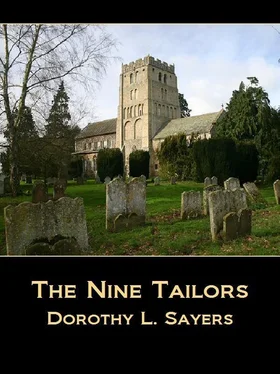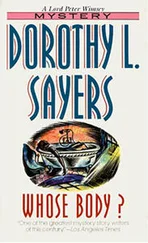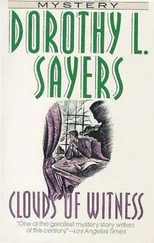Dorothy Sayers - The Nine Tailors
Здесь есть возможность читать онлайн «Dorothy Sayers - The Nine Tailors» весь текст электронной книги совершенно бесплатно (целиком полную версию без сокращений). В некоторых случаях можно слушать аудио, скачать через торрент в формате fb2 и присутствует краткое содержание. Жанр: Классический детектив, на английском языке. Описание произведения, (предисловие) а так же отзывы посетителей доступны на портале библиотеки ЛибКат.
- Название:The Nine Tailors
- Автор:
- Жанр:
- Год:неизвестен
- ISBN:нет данных
- Рейтинг книги:3 / 5. Голосов: 1
-
Избранное:Добавить в избранное
- Отзывы:
-
Ваша оценка:
- 60
- 1
- 2
- 3
- 4
- 5
The Nine Tailors: краткое содержание, описание и аннотация
Предлагаем к чтению аннотацию, описание, краткое содержание или предисловие (зависит от того, что написал сам автор книги «The Nine Tailors»). Если вы не нашли необходимую информацию о книге — напишите в комментариях, мы постараемся отыскать её.
The Nine Tailors — читать онлайн бесплатно полную книгу (весь текст) целиком
Ниже представлен текст книги, разбитый по страницам. Система сохранения места последней прочитанной страницы, позволяет с удобством читать онлайн бесплатно книгу «The Nine Tailors», без необходимости каждый раз заново искать на чём Вы остановились. Поставьте закладку, и сможете в любой момент перейти на страницу, на которой закончили чтение.
Интервал:
Закладка:
II.
A FULL PEAL OF GRANDSIRE TRIPLES
(Holt’s Ten-Part Peal)
5040
By the Part Ends
First Half
246375
267453
275634
253746
235476
Second Half
257364
276543
264735
243657
234567
2nd the Observation.
Call her:
1st Half) Out of the hunt, middle, in and out at 5, right, middle, wrong, right, middle and into the hunt (4 times repeated).
2nd Half) Out of the hunt, wrong, right, middle, wrong, right, in and out at 5, wrong and into the hunt (4 times repeated).
The last call in each half is a single; Holt’s Single must be used in ringing this peal.
THE FIRST PART
MR. GOTOBED IS CALLED WRONG WITH A DOUBLE
Thou shalt pronounce this hideous thing
With cross, and candle, and bell-knelling.
JOHN MYRC: Instructions for Parish Priests (15th century).
Spring and Easter came late together that year to Fenchurch St. Paul. In its own limited, austere and almost grudging fashion the Fen acknowledged the return of the sun. The floods withdrew from the pastures; the wheat lifted its pale green spears more sturdily from the black soil; the stiff thorns bordering dyke and grass verge budded to a softer outline; on the willows, the yellow catkins danced like little bell-rope sallies, and the silvery pussies plumped themselves for the children to carry to church on Palm Sunday; wherever the grim banks were hedge-sheltered, the shivering dog-violets huddled from the wind.
In the Rectory garden, the daffodils were (in every sense of the word) in full blow, for in the everlasting sweep and torment of wind that sweeps across East Anglia, they tossed desperately and madly. “My poor daffodils!” Mrs. Venables would exclaim, as the long leaf-tufts streamed over like blown water, and the golden trumpets kissed the ground, “this dreadful old wind! I don’t know how they stand it!” She felt both pride and remorse as she cut them — sound stock varieties, Emperor, Empress, Golden Spur — and took them away to fill the altar-vases and the two long, narrow, green-painted tin troughs that on Easter Sunday stood one on either side of the chancel screen. “The yellow looks so bright,” thought Mrs. Venables, as she tried to persuade the blossoms to stand upright among the glossy green of periwinkle and St. John’s Wort, “though it really seems a shame to sacrifice them.”
She knelt before the screen on a long red cushion, borrowed from a pew-seat to protect her “bones” from the chill of the stone floor. The four brass altar-vases stood close beside her, in company with a trug full of flowers and a watering-can. Had she tried to fill them at the Rectory and carry them over, the sou’-wester would have blown them into ruin before she had so much as crossed the road. “Tiresome things!” muttered Mrs. Venables, as the daffodils flopped sideways, or slid down helplessly out of sight into the bottom of the trough. She sat up on her heels and reviewed her work, and then turned, hearing a step behind her.
A red-haired girl of fifteen, dressed in black, had come in, bearing a large sheaf of pheasant-eye narcissi. She was tall and thin and rather gawky, though with promise of becoming some day a striking-looking woman.
“Are these any use to you, Mrs. Venables? Johnson’s trying to get the arums along, but the wind’s so terrific, he’s afraid they’ll be broken all to bits in the barrow. I think he’ll have to pack them into the car, and drive them down in state.”
“My dear Hilary, how kind of you! Yes, indeed — I can do with all the white flowers I can get. These are beautiful, and what a delicious scent! Dear things! I thought of having some of our plants stood along there in front of Abbot Thomas, with some tall vases among them. And the same on the other side under old Gaudy. But I am not ”—here she became very much determined—“I am not going to tie bunches of greenery on to the font and the pulpit this year. They can have that at Christmas and Harvest Festival, if they like, but at Easter it’s unsuitable and absurd, and now that old Miss Mallow’s gone, poor dear, there’s no need to go on with it.”
“I hate Harvest Festivals. It’s a shame to hide up all this lovely carving with spiky bits of corn and vegetable marrows and things.”
“So it is, but the village people like it, you know. Harvest Festival is their festival, Theodore always says. I suppose it’s wrong that it should mean so much more to them than the Church seasons, but it’s natural. It was much worse when we came here — before you were born or thought of, you know. They actually used to drive spikes into the pillars to hold up wreaths of evergreens. Quite wicked. Just thoughtlessness, of course. And at Christmas they had horrible texts all across the screens and along that abominable old gallery — done in cotton-wool on red flannel. Disgusting, dirty old things. We found a great bundle of them in the vestry when we came here, full of moths and mice. The Rector put his foot down about that. ”
“And I suppose half the people went over to the Chapel.”
“No, dear — only two families, and one of them has come back since — the Wallaces, you know, because they had some sort of dispute with the Minister about their Good Friday beanfeast. Something to do with the tea-urns, but I forget what. Mrs. Wallace is a funny woman; she takes offence rather easily, but so far — touch wood”—(Mrs. Venables performed this ancient pagan rite placidly on the oak of the screen)—“so far, I’ve managed to work in quite smoothly with her over the Women’s Institute. I wonder if you’d just step back a little way and tell me if these two sides match.”
“You want a few more daffs on the decani side, Mrs. Venables.”
“Here? Thank you, dear. Is that better? Well, I think it will have to do. Oo-oh! my poor old bones! Yes, it’ll pass in a crowd with a push, as they say. Oh, here’s Hinkins with the aspidistras. People may say what they like about aspidistras, but they do go on all the year round and make a background. That’s right, Hinkins. Six in front of this tomb and six the other side — and have you brought those big pickle-jars? They’ll do splendidly for the narcissi, and the aspidistras will hide the jars and we can put some ivy in front of the pots. Hinkins, you might fill up my watering-can. How is your father to-day, Hilary? Better, I hope.”
“I’m afraid he isn’t any better, Mrs. Venables. Doctor Baines is very much afraid he won’t get over it. Poor old Dad!”
“Oh, my dear! I’m terribly sorry. This has been a dreadful time for you. I’m afraid the shock of your dear mother’s death coming so suddenly was too much for him.”
The girl nodded.
“We’ll hope and pray it isn’t as bad as the doctor thinks. Dr. Baines always takes a pessimistic view of everything. I expect that’s why he’s only a country practitioner, because I think he’s really very clever; but patients do like a doctor to be cheerful. Why don’t you get a second opinion?”
“We’re going to. There’s a man called Hordell coming down on Tuesday. Dr. Baines tried to get him to-day, but he’s away for Easter.”
“Doctors oughtn’t to go away,” said Mrs. Venables, rather uncharitably. The Rector never took holidays at the greater festivals, and scarcely ever at any other time, and she could not quite see that there was any necessity for the rest of the world to do so.
Hilary Thorpe laughed rather ruefully.
“I feel a little like that myself. But he’s supposed to be the very best man there is, and we’re hoping that a couple of days won’t make all that difference.”
Читать дальшеИнтервал:
Закладка:
Похожие книги на «The Nine Tailors»
Представляем Вашему вниманию похожие книги на «The Nine Tailors» списком для выбора. Мы отобрали схожую по названию и смыслу литературу в надежде предоставить читателям больше вариантов отыскать новые, интересные, ещё непрочитанные произведения.
Обсуждение, отзывы о книге «The Nine Tailors» и просто собственные мнения читателей. Оставьте ваши комментарии, напишите, что Вы думаете о произведении, его смысле или главных героях. Укажите что конкретно понравилось, а что нет, и почему Вы так считаете.












